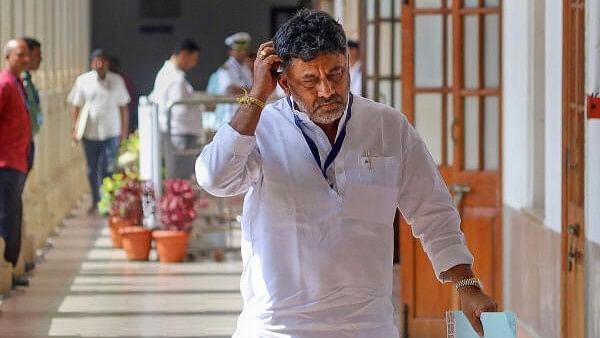
KPCC President and Karnataka Deputy Chief Minsiter D.K. Shivakumar during the voting for Rajya Sabha elections at the Vidhana Soudha, in Bengaluru, Tuesday, Feb. 27, 2024.
Credit: PTI Photo
The results of the Rajya Sabha elections in Karnataka, Uttar Pradesh, and Himachal Pradesh are out. The results demonstrate the BJP’s strengthening grip over north India, the near-decimation of the Congress in Himachal Pradesh if the government falls as a result of its members cross-voting and moving over to the BJP, and the failure of the Samajwadi Party to hold its flock together with its chief whip himself voting for the BJP.
Let me first dwell on the Karnataka results. Elections were held for four vacancies. Considering the number of seats held by the Congress and the BJP in the state assembly, it was anticipated that the Congress would win three seats and the BJP one.
The results were on expected lines. Notably, the Siddaramaiah-Shivakumar duo not only held their flock together but also secured the vote of one BJP member and persuaded another to abstain. The results prove that the state remains a Congress stronghold despite the BJP’s attempts to weaken it.
The BJP, in alliance with the Janata Dal (S) for the Lok Sabah polls, thoughtlessly yielded to the pressures of the JD (S) to field a fifth candidate, hoping for cross-voting from Congress members, but this strategy failed.
Given the strength of the JD(S) in the state assembly (19 seats), success was nearly impossible for both the JD(S) and BJP. Given the near existential crisis the JD(S) is facing, it was clear that putting up a fifth candidate was doomed to fail.
I would go a step further and say that the alliance the BJP has struck with the JD (S) for the Lok Sabha polls was also unnecessary, as the deal may not yield any real benefits to the BJP.
It looks like the BJP central leadership’s paranoia about the Congress Party winning in a big way in the Lok Sabha polls led to this unprincipled alliance, which is resented by the workers of both parties at the state level. The BJP is reported to have agreed to cede five seats to the JD(S), thereby agreeing to contest in only 23 constituencies. It is anybody’s guess as to how many of the 23 seats the party would win.
Even for the JD (S), the alliance decision was unnecessary as it would perhaps win one or two Lok Sabha seats on its own. If the Congress Party fields, as is reported, its popular ministers as candidates, it is likely to cost the BJP and the JD (S) electorally. These are issues that the alliance leaders should seriously ponder.
As for the BJP, as already noted, the party has scored significant victories in the UP. Instead of the seven seats it was expected to win, based on its numerical strength in the assembly, it has won eight, thanks to cross-voting by the SP legislators. Party supremo Akhilesh Yadav has conceded defeat to the BJP, though two of his candidates have won.
Speculation is rife that the Rajya Sabha poll results may place the BJP in an advantageous position in the Lok Sabha contest. The recent inauguration of the Ram temple in Ayodhya may move some of the uncommitted voters to the BJP fold.
Himachal Pradesh’s results have come as a surprise, as the ruling Congress failed to ensure the victory of its candidate. With six of its voters resorting to cross-voting to help the BJP candidate (a former Congressman), both candidates in the fray got 34 votes each, leading to a draw, with the results declared in favour of the BJP candidate.
It is likely that the government may go out of office if the BJP introduces a no-confidence motion or if the finance bill fails to get passed in the on-going budget session. If that happens, the Congress Party would be completely wiped out of the North Indian electoral map. This is not a good sign, given the upcoming Lok Sabha elections.
At a larger level, the Rajya Sabha poll outcomes show that both the BJP and the Congress have practiced politics devoid of principles by wooing or buying the opposition lawmakers to vote for their candidates, which is indeed a sad commentary on our parliamentary democracy.
Voters, who are the ultimate sovereigns, should realise the need for cleansing the system by deciding to punish parties for their unethical practices. However, in the times that we live, it may be perhaps unrealistic to expect a paradigm shift from crass, winnability-motivated politics to value-based politics.
(The writer is a former professor of political science at Bangalore University)